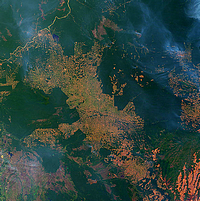Amazonian countries, it seems, will have one chance and one chance only to work out a common negotiating position ahead of the Copenhagen climate change summit next month. It will come in the form of a meeting on Thursday, Nov. 26, organized by Brazilian President Luiz Inacio Lula da Silva.
Perhapsreaching a regional agreement was seen as a formality, one so uncontroversial that even the feuding presidents of Colombia and Venezuela would join in. After all, the Amazon rain forest is a single ecosystem, and all the Amazonian countries emphasize the urgent need for its conservation. There is also broad acceptance on why theAmazon continues to be cut down: Itis worth more dead than alive, as there are markets for meat, soya and minerals, but not for environmental services such as carbon storage, water recycling and the protection of biodiversity. There is also agreement that because those services are global, so is the responsibility to pay for them.
However, if Lula expects consensus much beyond these points, hewill likely leave disappointed.The reality is that Amazonian countries have conflicting conservation strategies, not least because limited finance is on offer in the climate talks, and each government is looking to maximize its share.

